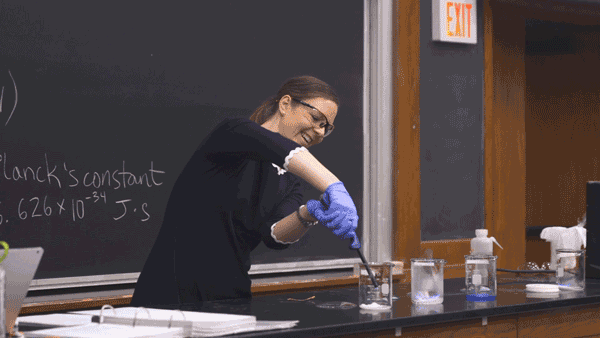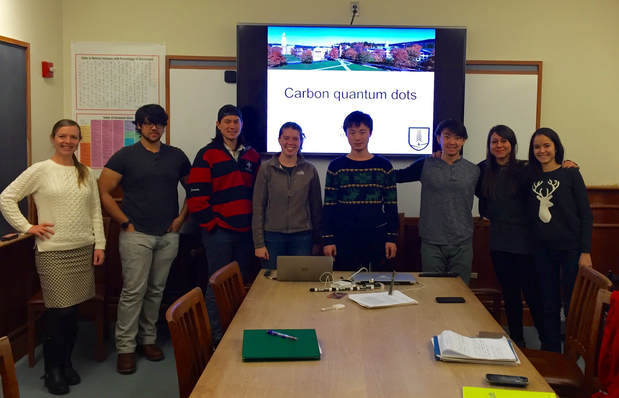Undergraduate Courses
CHEM 6 (General Chemistry)
Pre-requisites: MATH 3 and CHEM 5 (or equivalent AP credits)
Description: CHEM 6 focuses on fundamentals of chemistry, including kinetics, quantum mechanics, simple models of bonding, and intermolecular interactions at a University-level depth. Numerical analysis and logical reasoning (rather than memorization) are at the heart of this course. The acquired problem-solving skills will be transferable to a wide range of circumstances, not necessarily related to chemistry topics. In addition to increased knowledge of Chemistry, this course will advance the students' ability, when confronted with the description of a problem, to assess what is known, clarify what needs to be determined, and then make an effective connection between the two. This class features frequent lecture demonstrations, group problem-solving, and clicker questions that facilitate frequent feedback between the instructor and students.
Check out links to some of my favorite lecture demonstrations below.
Pre-requisites: MATH 3 and CHEM 5 (or equivalent AP credits)
Description: CHEM 6 focuses on fundamentals of chemistry, including kinetics, quantum mechanics, simple models of bonding, and intermolecular interactions at a University-level depth. Numerical analysis and logical reasoning (rather than memorization) are at the heart of this course. The acquired problem-solving skills will be transferable to a wide range of circumstances, not necessarily related to chemistry topics. In addition to increased knowledge of Chemistry, this course will advance the students' ability, when confronted with the description of a problem, to assess what is known, clarify what needs to be determined, and then make an effective connection between the two. This class features frequent lecture demonstrations, group problem-solving, and clicker questions that facilitate frequent feedback between the instructor and students.
Check out links to some of my favorite lecture demonstrations below.
|
|
|
|
CHEM 10 (Honors General Chemistry)
Pre-requisites: CHEM 10 placement test or equivalent AP credits for AP Chemistry and AP Calculus
Description: CHEM 10 focuses on fundamental of chemistry, including quantum mechanics, simple models of bonding, phases of matter and their transitions, thermodynamics and kinetics at a University-level depth. Numerical analysis and logical reasoning (rather than memorization) are at the heart of this course. The acquired problem-solving skills will be transferable to a wide range of circumstances, not necessarily related to chemistry topics. In addition to increased knowledge of Chemistry, this course will advance the students' ability, when confronted with the description of a problem, to assess what is known, clarify what needs to be determined, and then make an effective connection between the two. This class features frequent lecture demonstrations, group problem-solving, and clicker questions that facilitate frequent feedback between the instructor and students.
Pre-requisites: CHEM 10 placement test or equivalent AP credits for AP Chemistry and AP Calculus
Description: CHEM 10 focuses on fundamental of chemistry, including quantum mechanics, simple models of bonding, phases of matter and their transitions, thermodynamics and kinetics at a University-level depth. Numerical analysis and logical reasoning (rather than memorization) are at the heart of this course. The acquired problem-solving skills will be transferable to a wide range of circumstances, not necessarily related to chemistry topics. In addition to increased knowledge of Chemistry, this course will advance the students' ability, when confronted with the description of a problem, to assess what is known, clarify what needs to be determined, and then make an effective connection between the two. This class features frequent lecture demonstrations, group problem-solving, and clicker questions that facilitate frequent feedback between the instructor and students.
See a Dartmouth News highlight on Prof. Mirica's Teaching and Research here.
Graduate Courses
CHEM 157 (Advanced Topics in Organic Chemistry)
Course Title: Functional Nanomaterials: Synthesis and Applications
Pre-requisites: Organic Chemistry
Description: This course focuses on synthesis, structure, and properties of nanomaterials. It begins with the introduction to the fundamental principles for understanding the size-dependent properties of materials that emerge at the nanoscale. It surveys a number of experimental techniques that can be utilized for observing and analyzing nanostructures, including X-ray techniques, scanning probe microscopy, and electron microscopy. It further details how strategies for synthesis, surface chemistry, and self-assembly can be utilized to control and tailor structure and properties of nanomaterials. Finally, the course highlights the applications of nanomaterials in chemical sensing, disease diagnosis and treatment, energy conversion and storage, and information storage. The class features a Wikipedia editing project, and visiting lectures highlighting modern technological applications of nanomaterials from PhD-level industrial speakers and entrepreneurs.
See the highlight of the Wikipedia Editing Project by Dartmouth EdTech here.
Course Title: Functional Nanomaterials: Synthesis and Applications
Pre-requisites: Organic Chemistry
Description: This course focuses on synthesis, structure, and properties of nanomaterials. It begins with the introduction to the fundamental principles for understanding the size-dependent properties of materials that emerge at the nanoscale. It surveys a number of experimental techniques that can be utilized for observing and analyzing nanostructures, including X-ray techniques, scanning probe microscopy, and electron microscopy. It further details how strategies for synthesis, surface chemistry, and self-assembly can be utilized to control and tailor structure and properties of nanomaterials. Finally, the course highlights the applications of nanomaterials in chemical sensing, disease diagnosis and treatment, energy conversion and storage, and information storage. The class features a Wikipedia editing project, and visiting lectures highlighting modern technological applications of nanomaterials from PhD-level industrial speakers and entrepreneurs.
See the highlight of the Wikipedia Editing Project by Dartmouth EdTech here.



